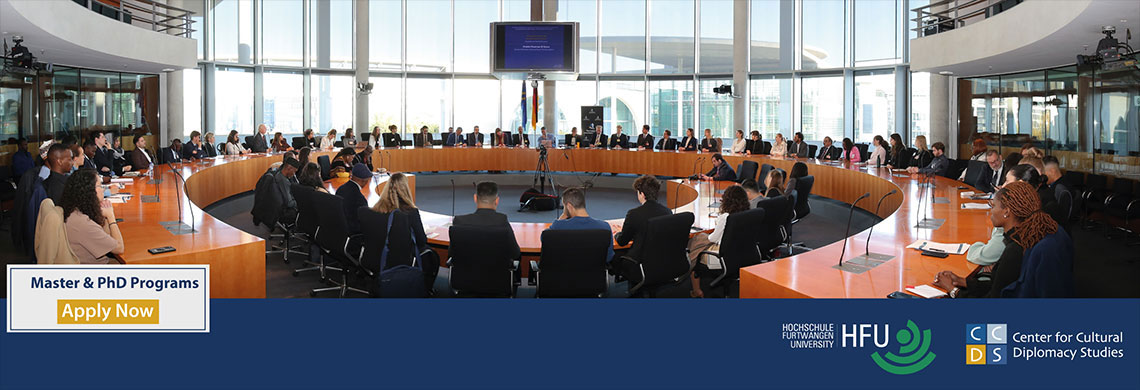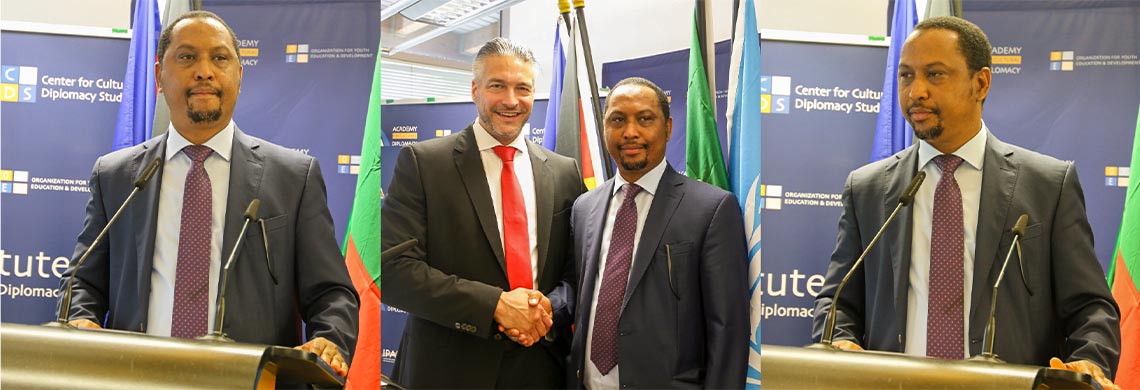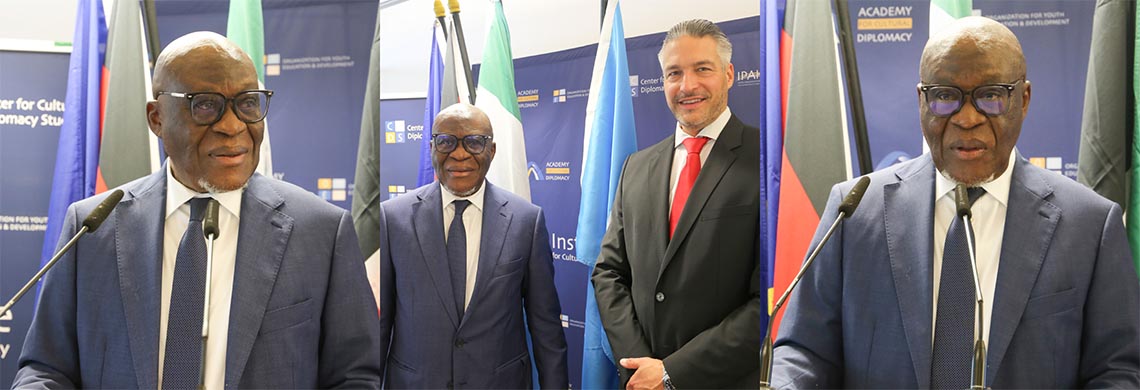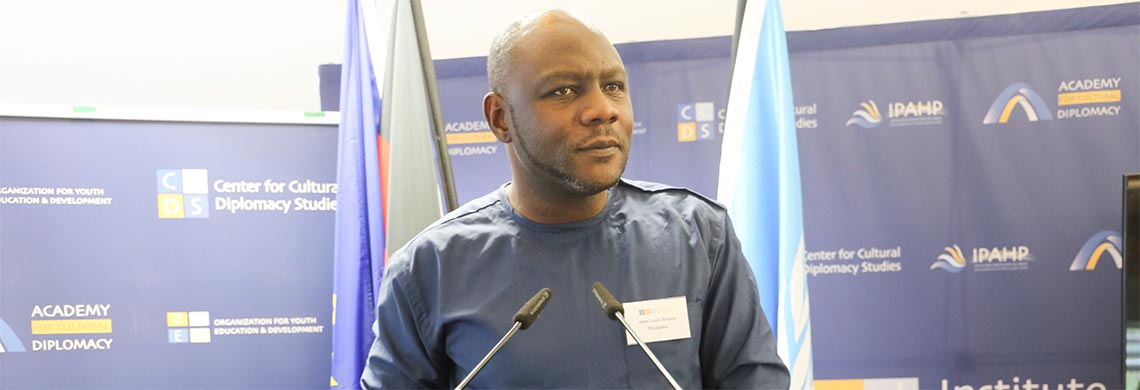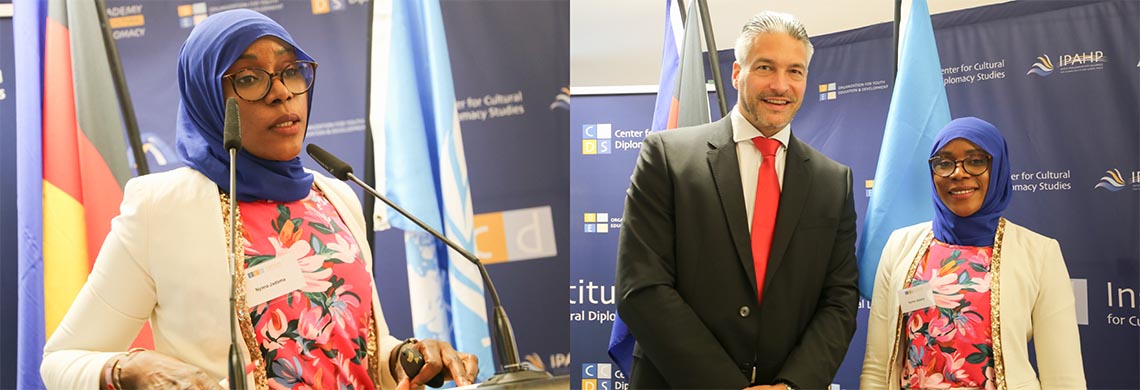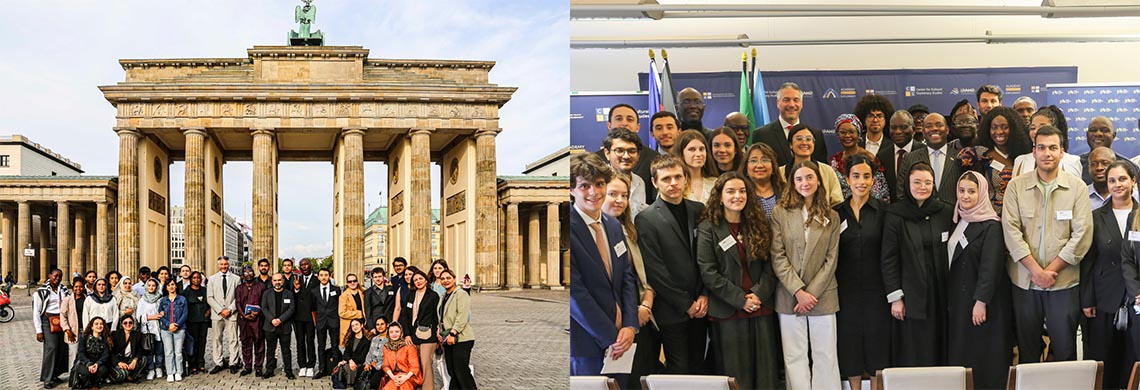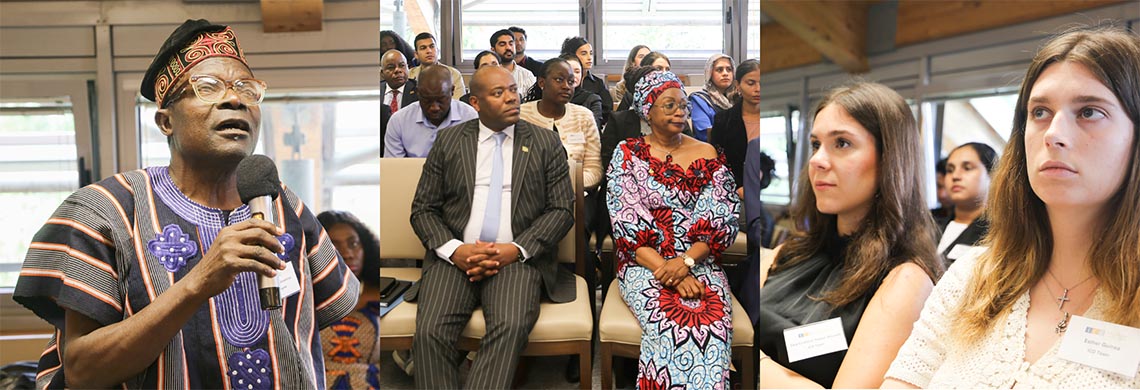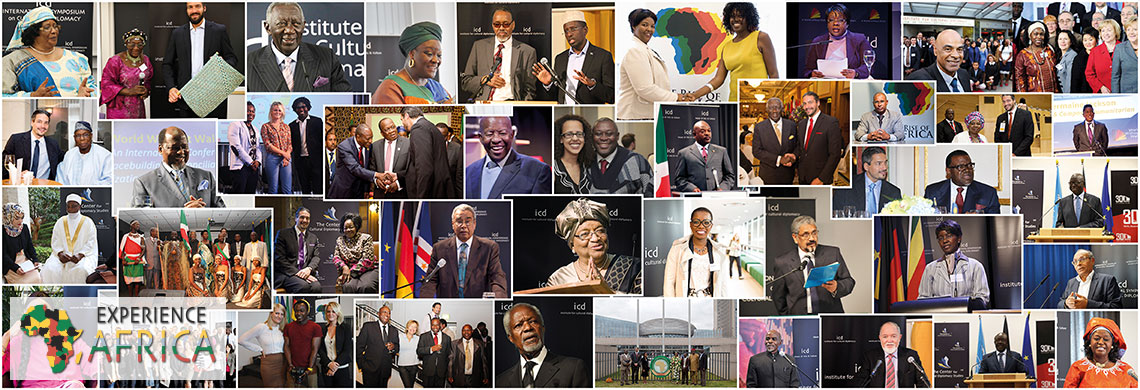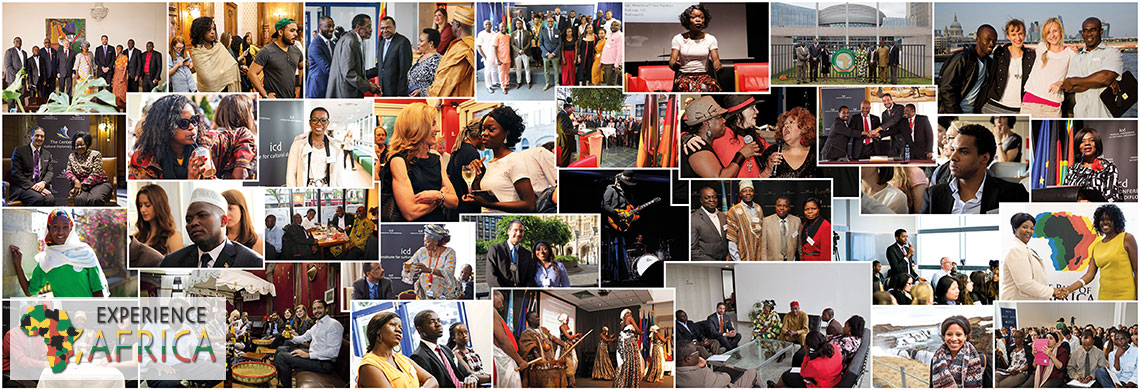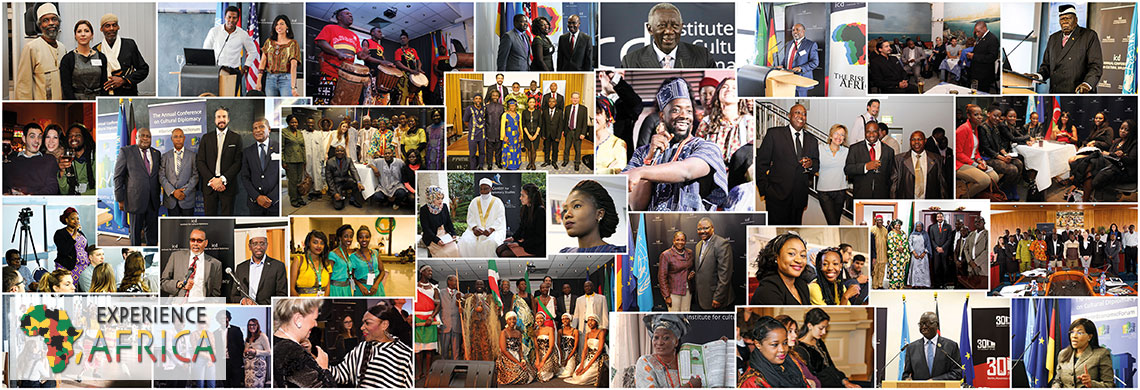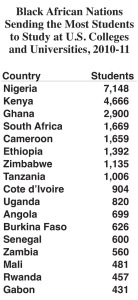The ICD “Experience Africa” Program
The African Diaspora

Introduction
“When once were dispersions, there now is Diaspora”[i]. As illustrated by this quote, the notion of Diaspora underlines the specificity of some migration phenomenon, thereby contributing to make sense out of certain transnational movements.
Etymologically, the word diaspora, meaning dispersal, stems from the Greek sporo (seed), and speira (to spree). Originally, it was used in the Antique tradition to refer to the “dispersion of Hellenic establishments around the Mediterranean Sea”[ii]. Later on, in the biblical tradition, it was used to discuss the dispersal of the Jewish People.
Since the 1980s-90s, Diasporas have become the focus of numerous academic research and publications in the field of social sciences, gradually referring to more and more different communities around the world. Today, Diasporas can be defined as “national migrant communities living in interaction among themselves and with their country of origin”[iii]. The notion of diaspora must be distinguished with other phenomenon of migration, as the importance of the ties between members of the Diasporas and their country of origin is prevalent.
The nature of these ties is diverse: they can be political, economic, cultural as well as social and academic. Often, Diasporas are also linked to a “founding myth” related to their place of origin and to the conditions under which they were forced or urged to leave their motherland. As a matter of fact, according to Dominique Schnapper[iv], many Diasporas are built on a major event, often dramatic, which ties a community together, despite its geographical dispersion. This is, for example, the case for the Jewish Diaspora, which appeared after the destruction of the Temple and the annexation of Judea by Romans.
As of today, the African Diaspora is one of the most important in the world in terms of numbers. According to the African Union, the African Diaspora is composed of “people of African origin living outside of the continent, irrespective of their citizenship and nationality, and who are willing to contribute to the development of the continent and the building of the African Union”[v].
Historical Evolution of African Diaspora in the World
Three main periods can be identified, when it comes to giving an overview of the history of African Diasporas. Historically, the first wave of forced African migrations began during the Transatlantic Slave Trade (16th-19th century). Europeans captured or bought African slaves, mostly from West Africa, and brought them to Europe, and later on to South and North America. The number of Africans who were shipped across the Atlantic is estimated to be around 12 million[vi].
This population movement can be considered as the migration that paved the way for the constitution of the first African community outside of Africa. In point of fact, slave trade can be considered as the “founding myth” of the African Diaspora in Europe and in America. Many Africans were deported out of Africa during this period, but the feeling of belonging to a community, the African community, did not disappear. In a way, this feeling became even stronger.
The transatlantic slave trade contributed mostly to creating a large community of African origins in the American continent, especially in the US and in Brazil. This diaspora belongs to the first wave of migration, and is often referred to as the historical diaspora. It is to be differentiated, from later movements of population of the 1960s, in the sense that these migrants blended more into local populations, partly losing the connection with their land of origin. The members of this diaspora tend to be more attached to Africa as a continent of origin, rather than linked to a specific country in Africa. They are still considered as part of the diaspora. In fact, if the concrete connection to their land of origin was often lost throughout generations, symbolic ties were kept, which will be assessed later on in this paper.
The colonial period, from the mid XIX° century up until the 1960s, contributed to creating strong, although very unequal, ties between Africa and Europe. The exchanges between the two continents were strengthened, and the colonization process contributed to the exploitation of the African Continent, thereby creating cultural and economic bonds which later on facilitated migrations and the creation of an African Diaspora in Europe. As a result, an important part of the African Diaspora can be found in European countries that had colonial history (France, United-Kingdom, Portugal, the Netherlands, Belgium, Italy, Germany and Spain).
The second African diaspora generation is the result of the difficult process of decolonization. During the late-colonial period, early post-independence, starting from the 1950s, there was a great increase of migrations coming from Africa to Europe in terms of numbers, creating the conditions for the settlement of a longstanding and active African Diaspora. Despite gains of independence, economic and cultural ties remained strong between the two regions, especially with the old colonist countries. Many people willingly left the African continent, in the search for better working or educational opportunities, mostly for Europe and North America. This period marked a rather important increase in emigration aimed at acquiring better quality of life and education. This diaspora is mainly the product of “voluntary migrations”. Among the members of this generation of migrants, the subsistence of ties with the country of origin and their nature is rather fluctuating. The reasons for why migrants left their homeland differed, the factors that contributed to migration were not only political persecution but also issues relating to their cultural and socio-economic background.
Starting from the 1980s, the most common grounds on which Africans left their countries changed in its nature. Fleeing from broken and breakable states, wars, hopeless poverty or political persecution became a major cause of emigration, up until today[vii]. This wave of African emigration influences all parts of societies, and the sociological profiles of the migrants are very diverse, as Africans of all hierarchies, occupations and age groups can be found. If the cultural ties are, for the most part, very vivid, there is in general no plan of returning to the motherland, mostly because of the existing deplorable conditions.
The two ladder waves of migration are often referred to as contemporary diaspora. The members of this diaspora tend in general to keep more connections to their country of origin, with various ways of relating.
As of today, the African Diaspora is one of the most active communities of citizens outside of their countries. Different institutions and African nations are calling them on more and more, particularly in the attempt of gathering forces in order to foster human development in Africa.
Statistics
Outline of the African Presence in the World
This part will focus on the percentage of European inhabitants born in Africa or from African descent. Diaspora has been defined as “people of African origin living outside of the continent, irrespective of their citizenship and nationality, and who are willing to contribute to the development of the continent and the building of the African Union”[i]. We will discuss the case of Italy, the UK, France, Australia, the United Sates of America, Asia and South America as a whole.

The figure represents the part of African migrants in different regions of the world. This could help us localize the recent African Diaspora. However, we have to distinguish diaspora from migrations. For the International Organization for Migration, migrations are “the movement of a person or a group of persons, either across an international border, or within a state. It is a population movement, encompassing any kind of movement of people, whatever its length, composition and causes; it includes migration of refugees, displaced persons, economic migrants, and persons moving for other purposes”[ii]. As a consequence, to form a diaspora migrants have to contribute to the development of the continent. It is not only for the reason that there is an important rate of African migrants in a certain region that there is an African diaspora, even if it is often the case. According to the figure, Europe is the second destination for African migrants (29.4% of the African migrants choose to go in Europe).
As we have seen in the introduction, the high presence of the African diaspora in Europe can be explained with the historical trends observed between the continents (Atlantic Slave, Trade and Colonization). Furthermore, the geographical proximity also plays a role. Only 5% of the African migrations are directed to North America and 0.2% to Latin America. However, there is a strong African Diaspora in this part of the globe (see table 2) related to the historical past, especially to the Atlantic Slave Trade. Last but not least, it is important to note that 1.3% of the African migrations are directed to Asia. In fact, since recent years, a lot of studies have underlined the growing African Diaspora in Asia, especially in China.
Table 2: Africa Diaspora by Countries
| Country | Number | Percent |
|---|---|---|
| Brazil | 96.587.036 | 50.64 |
| China | 500.000 | 0.038 |
| Columbia | 1.837.015 | 4.0 |
| Cuba | 1.027.394 | 9.3 |
| Dominican Republic | 1.138.471 | 11 |
| France | 2.362.099 | 3.63 |
| Haiti | 9.710.212 (black and black mixed race) | 95 |
| Italy | 600.000 | 1 |
| Jamaica | 2.679.200 | 92.1 |
| Norway | 88 764 | 1.8 |
| Portugal | 201.200 | 2 |
| Spain | 200.000 | 0.5 |
| United Kingdom | 3.3 | 2.015.400 |
| United States | 40.977.640 | 12.85 |

Haiti
95% of the Haitian population comes from Africa. This is related to the history of the country. Between 1492 and 1804 the Spanish and the French occupied Haiti and imported with them a big number of slaves from Africa. As a consequence, the population of Haiti, count as an important rate of African descendants, which belongs to the first wave of the African Diaspora. Furthermore, since 2012 Haiti has been a member of the African Union. The adhesion reinforces Haiti belonging to the African Diaspora. Therefore, according to the definition of the African Diaspora we have referred to in our introduction, people who are contributing to the building of the African Union belong to the African Diaspora.
Apart from being a member of the African Union, a lot of examples illustrate the proximity between Africa and Haiti. In 1936, the country exposed the invasion of Ethiopia by Italy. During the decolonization process, Haiti supported African countries, which were claiming their independence.
United Kingdom
The African diaspora community first emerged in Britain in the Roman period but comparatively little is known until the sixteenth century, when African arrived in greater numbers, most of them being victims of the slave trade. This period, ending in the nineteenth century, has been called the “old” diaspora; a “new” diaspora commenced with the end of the slave trade and most Africans thereafter came voluntarily as students and workers.
Africans created community organizations in the diaspora, reflecting new “self-identifications and solidarities”. Members of the host society supported the African migrant community, particularly those who had connections with the missionary societies. For many Africans, like, G.Daniels Ekarte, mission networks provided another means of support in the diaspora. Africans relied upon these networks for financial assistance, guidance and help in times of trouble. Those who have studied diaspora communities understand the importance of “networks” in sustaining Africans abroad. The term “mission networks” refers here to the often extensive organizations brought together by the work of missionary societies, connecting a range of religious, medical and educational facilities in communities outside of Europe with religious, educational and political groups inside of Europe.
Ekarte was part of the “new” diaspora, arriving in Britain in the interwar period; it can be asserted with more confidence that by the end of the century there were more than a million of African migrants living in Britain[xii].
France
The African diaspora in France is one of the largest in the world. Their members are from its former colonies in Africa and from its overseas territories in the Caribbean. The largest African community in Africa is the Algerians (730.000). Until it gained independence in 1962, Algeria was a part of the French territory. France also had strong ties with Morocco and today Moroccans are the second largest group of immigrants in France (670.000). African immigrants came to France in consequence of the colonization process and, from the 60s onwards, to seek employment.
The African community is well assimilated in France. Christiane Taubira, who is from Caribbean descent, is the current Minister of Justice. Other African descendants or mixed race political leaders are, for instance, Harlem Desir and Senegalese born Rama Yade. The African diaspora is also involved in culture, sport and business. However, they are still a lot of issues that need to be addressed especially in the French suburbs. Inhabitants from these suburbs have to cope with high levels of unemployment and cultural clashes with the rest of society and as a result are often isolated. The African diaspora not only contributes to the French society, it also supports the economies of their countries of origin through capital flows.
Italy
Italy has become an important destination for African migrants. According to the last population census in Italy by the National Institute for Statistics (Istat) in 2011, Italy hosted 871,126 immigrants from Africa, 22% of the total amount of immigrants in Italy. The majority of them 403,592 (46%) are from Morocco, which proves to be the most populous African community in Italy[xiii]. This is due to the geographical proximity of the North African country with Italy.
Morocco is one of the great protagonists of the intense migration that, in particular from the Second World War, marked the Mediterranean basin as a result of differential demographic, economic and employment between the two shores. Even if France has a higher number of immigrants from Morocco, Italy has seen an increase in their presence after the first oil crisis (1973) when the majority of European countries reacted by using restrictive immigration policies.
More in general, Italy receives migrants from all the Northern part of Africa, being 69% of the total amount of people coming from Africa. This could be explained by the fact that Italy is an entering point to the European Union due to its proximity with the North part of Africa. However, in recent years, there has been an increase in the percentage of those immigrants coming from the Occidental part of Africa (204,757), such as states like Senegal (about 67,000), Nigeria and Ghana (about 40,000 each)[xiv].
United States
A quarter of the African-American population in Boston, Miami and New York were born abroad and 8 percent of the total of African Americans in the US were born outside the country[xv]. Ever since the Immigration and Nationality act in 1965 and the opening of new legal channels, African immigrants have started to come to the US.
Today, Americans with African descent make up 13.5% of the total US-population. Throughout the last decades, they have been becoming increasingly more present in the middle classes. In 2002, 50.8% of all African Americans occupied so-called "white-collar-jobs" (academic professions and positions in management or administration). In 2003, 58.3% of all African American High School graduates were enrolled at a college within one year (compared to only 35.8% in 1982). The percentage of Caucasians students who attended college or university totaled 66.1%, less than 8% higher. However, the income of black people is still lower than that of white workers and unemployment rates, especially those of black young men, are higher.
Poverty continues to force many African Americans to live in city districts with high crime rates and drug abuse. In terms of government policy, affirmative action and quotas have been used to ensure that a certain percentage of jobs are allocated to workers with African descendants and that members of minorities constitute a specified amount of students in schools. The public discussion about the necessity, effectiveness and fairness of these programs intensified during the 1990s.
Latin America
African immigrants came to South America and the Caribbean as a result of the transatlantic slave trade. In the 1780s, slavery started to be criticized by the Christian Church, philosophers and economists and, as countries gained independence, slavery was abolished.
Over time, African descendants influenced most aspects of everyday life. Carnival, which used to be only celebrated by Afro-Latinos, has now become a public holiday in Brazil. Unlike African Diasporas in the rest of Latin America who combine their African past with the culture of their host country, African descendants in the Caribbean who account for more than 90% of the population, are in search of a new national identity. They do not define themselves in terms of Africans but rather as Jamaican or Haitian nationals, for instance. They came to terms with their past and no longer need to think of themselves as Africans.
Like other African communities in the world, the African diaspora in Latin America has to face adversity on a daily basis. In Brazil Afro-Latinos accounted for more than 50% of the population, 64% of them being poor and 69% of them being extremely poor. In Columbia, only 10% of the blacks are covered by the healthcare system against a 40% of white people[xvi].
Australia
According to the Government website, in 2006, population census 248,605 residents in Australia declared to come from Africa, living mostly in Sydney and in Melbourne. As a result, African migrants are 1% of the total Australian population[xvii]. Almost half of the African migrants to Australia come from South Africa (104,000). Moreover, in the last years, the government has also given humanitarian visas to almost 3,500 Africans, most of them due to a refugee status. According to the Government’s report, African migrants in Australia suffer from a high level of unemployment due to some problems including skill level, age, English language proficiency, and recent and relevant work experience[xviii].
Other problems that commonly affect African humanitarian migrants are the presence of a range of barriers to inclusion and integration, particularly in the areas of employment, education and training, social participation and political, civic and community participation. More specifically, the Australian government noted a necessity to create and implement targeted programs to increase access to higher education, issues associated with the high costs and complexity of recognition of overseas qualifications and the significant adjustment difficulties faced by African humanitarian migrants[xix].
We could observe how the Australian government is trying to fix these problems by working very closely with the African Diasporas communities and organizations to encourage them to provide the necessary support to strength their integration[xx]. It was in fact, created a new subcommittee within the Australian government, and intended to address African communities in particular[xxi].
Finally, in its report, the Australian government highlighted how important it could be for Australia to improve the relationship with African countries. Many African-born Australian residents could help making a real contribution to relations between Australia and countries in Africa due to their attachment to both continents. Furthermore, the diverse range of countries and cultures from which they come widens the scope for the development of relations[xxii].
Influence, Challenges and contributions of the African Diaspora
Pan-Africanism
Pan-Africanism unifies the cultural and political world of African diasporas and the self-determination of people from Africa, or at least of African origin, as well as the people of African descent resident outside Africa. Initially, there was an anti-slavery and anti-colonial movement amongst black people of Africa and the Diaspora in the late nineteenth century. Since then, the aims of Pan-Africanism have evolved through the ensuing decades[i].
This movement had its origin in the United States in the late nineteenth century, thanks to the work of the advocate M.M. Garvey. He stated the idea of creating a common state in Africa to welcome back all the African Americans. Later on, Du Bois claimed the need to gain full rights, both in Africa and in the countries in which African communities resided, created by the forced migration represented by the slave trade in the previous centuries. Pan-Africanism gained legitimacy with the founding of the African Association in London in 1897, and the first Pan-African conference was held, again in London, in 1900 when Henry Sylvester Williams, the power behind the African Association, and his colleagues were interested in uniting the African Diaspora, and gaining political rights for those of African descent[ii].
Between 1919 and 1945, Du Bois organized several conferences, which increased and expanded the influence on the development of the African descendants’ emancipation movement in the Americas and Europe, as a way of nationalism in colonial Africa. Moreover, between the world wars, Pan-Africanism became more related and influenced by communism and trade unionism, especially through the writings of George Padmore, Isaac Wallace-Johnson, Frantz Fanon, Aimé Césaire, Paul Robeson, CLR James, WEB Du Bois, and Walter Rodney. Significantly, Pan-Africanism had expanded beyond the continent into Europe, the Caribbean and America. WEB Du Bois organized a series of Pan-African Congresses in London, Paris, and New York in the first half of the twentieth century. International awareness of Africa was also heightened by the Italian invasion of Abyssinia (Ethiopia) in 1935[iii].
As a result, many leaders struggling for the independence from European colonial dominations were formed in this cultural and political context of Pan-Africanism. Among these, N. Nkrumah, J. Nyerere, A. Toure, M. Keita. The Pan-African ideal also inspired the emergence of regional groupings, some of which were short-lived, due to the immediate emergence of nationalistic feelings or tribal differences. There were also manifested divisions about the approach to be followed in respect of the Western countries and the former colonial powers: the countries 'reformists', the group gathered in Brazzaville, were contrasted those 'revolutionaries' of the group of Casablanca[iv].
Despite the process of decolonization leading to further fragmentation of the African continent there was still an opportunity to observe some policy initiatives in the key of Pan-Africanism. For example, the Organization of African Unity and then African Union, which was established in 1963[v].
Both in its mission and structure, the African Union was meant to represent a different and a new stage in the research for a contemporary pan-African unity. Despite this, soon after the creation of the Union, it became obvious that a commonly shared understanding of its place in the project and processes of unification and integration was still not in place.[vi] In fact, African people and especially African revolutionaries are facing today a curious phenomenon, a duality, which divides the Black African people into so-called Francophone and English speaking countries and ethnic groups[vii].
According to many authors such as Elenga M’buyinga, the O.A.U. does not have a clear perception on Africa’s important contemporary problematic, such as the problem of neo-colonialism. According to the author it is no coincidence that the unification of Africa is hardly on the agenda at the African Union due to these problematic that are impeding a proper unification. As a consequence, “the African Union has resulted in being is a Pan-Africanism without Pan-Africanists, the Pan-Africanism of the anti-Pan-Africanists”[viii].
Nowadays, Pan-Africanism has been relegated to a mere cultural and social philosophy rather than the strong political movement that used to be in the past. Authors such as Dr. Molefi Kete Asante, are trying to make African people, both in the continent and outside, more aware of the ancient glorious past and about the African heritage, for instance the ancient Egyptian and Nubian cultures. This aims to seek a re-evaluation of Africa's place, and the Diaspora, in the world[ix].
Pan-African movement was raised by world events such as, the Football World Cup in 2010, held in South Africa[x]. South Africa’s post-apartheid foreign policy was premised on the vision of “a better South Africa, a better Africa and a better world”[xi]. In fact, the promotion of the ideology of Pan-Africanism has been a central aspect of South African government foreign policy since 1999 as a way to promote peace, stability and integration within the nation and, more broadly, in the whole continent[xii].
President Mbeki was able to convince the FIFA’s authorities to host the World Cup, and was therefore permeated with the spirit of pan-Africanism and South Africanism and stressed the necessity to synergize the two.[xiii] As he wrote, by organizing such event his intent was to “send waves” of confidence all over the African continent and about the necessity of recreating “Africa’s revival” and South Africa’s desire to promote the African Renaissance[xiv]. As a result, deliberate efforts were made to merge pan-Africanism with South African nationalism in order to produce a consolidated hallmark of the African World Cup.
Impact of the Diaspora on the African continent
Early studies on immigration policy assumed that migrants leave their countries, settle in a new country, start integrating in their new society, and abandon their ties with their country of origin. Today, however, it is possible for immigrants to remain connected with and give back to their native countries while residing abroad, thus diminishing their loss of identity and separation from their countries of origin.
African governments are reaching out to diasporas. Ghana, Nigeria, Senegal, and South Africa have launched several plans to incorporate their diaspora communities as partners in development projects. Several African countries (among them Ethiopia, Ghana, Mali, Nigeria, Rwanda, Senegal, Tanzania, and Uganda) have established institutions (at the agency or ministerial level) to interact with the Diaspora.
“Reinforcing the Contributions of African Diasporas to Development” by Chukwu-Emeka Chikezie, offers some guidance to African governments seeking to make productive use of the resources of “their” diasporas for developmental gain. The guidance is drawn from the first 10 years of operation of the African Foundation for Development.
Economic Development
There has been a shift in the discussion from seeing the emigration of skilled people as a loss, to seeing skilled migration as an opportunity to get remittances, trade, investment projects and new knowledge. China; India; Israel; Japan; the Republic of Korea: and Taiwan, China are examples of economies that have tapped into their diasporas as a source of knowledge.
In addition, there has been a new emphasis on including both skilled and unskilled migrants as contributors to host and develop their home country. Some African countries are pursuing policies to develop links with Africans abroad, either to encourage them to return or to use their skills, knowledge or financial capital to foster African development. There is also a benefit for the country of origin when they allow dual citizenship. They can benefit because their migrants are then more willing to adopt the host country’s citizenship, which can improve their earnings and thus their ability to send remittances and invest in the origin country. Chiswick (1978) was the first to show a positive impact of naturalization on earnings.
The Economic Community of West African states has proposed establishing a dedicated financial instrument at a regional level to facilitate business contributions of the diaspora to the region. Even though these proposals are focused on the diaspora outside of Africa, there are also some initiatives for establishing an integrate approach to cross-border payment systems, including the transfer of remittances in the Economic Community of West African states and in the Economic Monetary Community of Central Africa. In some countries, encouraging growth of private sector networks may be more effective than direct government involvement in establishing links to the diasporas.
Some African governments are providing incentives to attract investment from the diasporas. For example, as mentioned, Ethiopia grants a yellow card to diaspora members, profiting from the same benefits and rights as domestic investors. Additional investment incentives for both foreign investors and the diaspora include income tax exemptions for two to seven years, 100 percent duty exemption on the import of machinery and equipment for investment projects, and 100 percent customs exemption on spare parts whose values does not exceed 15 percent of the total value of capital goods imported[xv].
Such policies have encouraged many in the Ethiopian diaspora to invest in small businesses in Ethiopia. Investments at this level include those in cafes, restaurants, retail shops, and transport services in big cities and small towns that were otherwise restricted to Ethiopian nationals living in the country[xvi]. Some countries are considering having one window at a government institution for the Diaspora in which all the paperwork in the different administrative levels can be handled. This could facilitate the Diaspora access to investment opportunities at home.
Human Development
To date, the interest of African governments in their diasporas has focused largely on those residing in countries outside Africa, such as the OECD[xvii] countries. Conferences and investment seminars, either at home or in the major capitals in OECD countries, are targeted to the Diaspora outside Africa.
Some developing countries are using dual citizenship to deepen ties with the Diaspora. Citizenship and residency rights are important determinants of a diaspora’s participation in trade, investment, and technology transfer with its origin country. Interest has also increased in providing dual citizenship to the children or grandchildren of migrants, in order to encourage their ties to the communities of their origins. But the potential gains for origin countries are limited because dual citizenship is not permitted in many destination countries.
Rwandan TOKEN program in 2005-07 is an example of a contribution made to human development. It involved visits by 47 volunteers to teach and provide technical assistance. The average stay was of less than two months and the variety of responsibilities constrained the transfer of knowledge to counterparts in host institutions.
Furthermore, there have been some proposals to take a more harmonized and integrated approach to the Diaspora within each regional economic community. For example, there is a proposal for the creation of a regional diaspora office within East African community.
It may be better to provide efficient procedures for all investors, without requiring proof of the investor’s origin and nationality. However, origin countries could still benefit from focusing their scarce resources on providing services to members of the Diaspora and on moving beyond consular services to a broader range of support for investors. Governments can also mobilize resources from Diasporas by encouraging their participation in social security, housing, and microfinance programs.
Peace-building
Peace Building can be a difficult topic for Diasporas due to the high level of political concern. In some cases the Diasporas do not wish to engage in this open combat because of its sensitivity, both in the country of origin and the country where it is located. Diasporas have to be seen as a part of an ongoing reconfiguration of power and authority at all levels and each state has to be studied separately because of their differences with their formation, thus, having a different process of adaption. Due to the differences between Nations, Diasporas, regardless of operating at a local, national or global level, should engage in different manners taking into account the historical relationship of these Diasporas with the African states. These organizations and its activity have been rising thanks to the crisis of states and the progress of neoliberalism.
According to the OECD (2009), diaspora knowledge flows could increase if barriers to short-term and circular mobility were removed. There has been an increase in mobility partnership pacts between European Union countries and Diasporas’ origin countries. For example, an agreement with Cape Verde focuses on visa and border-control policies, while India has initiated discussions with the European Union focusing on the export of high-skilled professionals. But more data and research are required to develop effective policies to encourage circular migration. These initiatives have taken various forms, ranging from the creation of dedicated ministries to deal with migrant communities to adding specific functions to the Ministry of Foreign Affairs, Ministry of Interior, Ministry of Finance, Ministry of Trade, Ministry of Social Affairs, Ministry of Youth, and so on.
Government institutions abroad, especially embassies and consulates, can play a key role in reaching out to the diaspora. They can help facilitate diaspora networks through the Internet, professional associations, embassies abroad, and cultural events. Some origin countries are supporting long-term and long-distance linkages between emigrants and their countries of origin.
Democracy
Holding dual or multiple citizenship provides an important link between Diasporas and their home countries. This can improve both a Diaspora’s connection with its origin country and its integration into the destination country. Citizenship and residency rights also make it easier to travel and own land. About half of the African countries with available information allow dual citizenship.
Origin countries can strengthen Diaspora ties by allowing their citizens who reside abroad to vote without returning. African countries have different modalities for voting. Some countries allow their citizens to vote abroad for presidential and legislative elections. Some countries give nationals abroad voting rights, and some reserve specific number of seats in parliament for Diaspora representatives. African countries have different modalities for voting.
In addition, some African countries that confer voting rights on their Diasporas, require advanced registration or allow voting in person only. In other countries, voting by postal ballot is also possible. Those who permanently live abroad can register with an embassy or consulate in the country of their permanent residence and can vote there. But the costs involved in registration may be high. For example, South Africa approved voting rights for Global South Africans in 2009, but was unable to register voters in most foreign countries for the 2009 elections. Only some 16,000 voters (out of the estimated 1.2 million South African citizens living abroad) who had been registered well in advance were able to participate in the 2009 elections.
Similarly, members of the Nigerian Diaspora requested the Independent National Electoral Commission to register Nigerians abroad so they could participate in the 2011 elections. Rwanda provides a useful example of an effort to engage the Diaspora through reaching out and encouraging voting by foreign citizens. Some governments have established institutions such as councils or decentralized entities that handle migrant community issues. However, several of these initiatives have not maintained their momentum or have been discontinued with a change of government.
Impact of African Migrations on host societies
As members of the Diaspora today in the world come from very differentiated backgrounds, and emigrated for various reasons, their relations and contributions to host societies are as well very diverse. The interaction between both also depends on the country of destination, as some nations are more creole than others. In the Caribbean nations for instance, such as in Jamaica, Haiti or Cuba, the community of African descent had a huge impact on the culture of the country, as migrations were very important in terms of numbers but also very influential in the cultural sphere[xviii].
In any case, the presence of an important African Diaspora in a given place creates opportunities for cultural exchanges between members of the different nations. National policies aimed at strengthening Diasporas are more and more put into place, notably through the action of embassies abroad. In fact, they are often the place where different nationals from a community gather, for instance during special events organized by the embassies themselves, in the perspective of enhancing the feeling of belonging to a national community[xix]. The integration of Diasporas within the framework of foreign policies, encompassed in the scope of the action of embassies, indicates the growing interest of public authorities for this group of citizens living abroad. It also contributes to promoting African cultures and nations, which are not always understood in the western world.
Originally, members of the Diaspora started organizing themselves and constituting associations in order to facilitate the integration of new migrants in the societies of destination. They are still of great help as of today on this matter, but they are also very much oriented towards keeping the connection alive between members of the Diaspora and their homeland, and towards contributing to the development of their country of origin, which they often leave because of deplorable living conditions.
Due to the different nature of the migrations[xx], the idea of returning to their homeland, which used to be very present for members of older generations of diaspora, is not as strong any more. Installed, and often well integrated in host societies, members of the diaspora often do not want to go back to their motherland to live once they retire, as the situation in their countries would not allow them to enjoy a decent life. In many cases, throughout the year, the choice is made to settle definitively in the North.
The impact of Diasporas as a phenomenon is also to be seen on the second generation of migrants. Generally speaking, children of African migrants, born in Europe, tend to emphasis the European part of their identity over their African origin, while still feeling attached to Africa and claiming to be of part of the African people. In terms of reshaping of identities, the Diasporas phenomenon tends to give birth to individuals who feel sort of uprooted, not genuinely anchored in one specific culture, but rather feeling “from everywhere and anywhere”[xxi], relating in different ways, both to their motherland and to their country of origin.
Intra-African Diaspora[xxii]
As stated in the introduction, there is an academic and an institutional debate as to who exactly is encompassed within the term of Diaspora, particularly when it comes to who should be targeted by the policies aiming at fostering “Diaspora Engagement”. One of the questions remaining is whether or not to include migrants within the African continent. The African Union chooses not to, as it states in its definition of the diaspora that it must necessarily be located outside of the continent[xxiii]. One of the grounds for this is that Africans who emigrate outside of Africa, mostly in the Northern hemisphere, are often wealthier, better-educated and more organized as Africans migrating within the continent, and have therefore more means of contributing to their home country development, thereby better fitting the second part of the definition of the African Union[xxiv].
This idea also stems from the fact that, for a very long time, migration movements have been analysed mostly as being a stream from the South to the North, while other geographically located migrations did not seem as relevant to social scientists.
However, South-South migrations are more important numerically, and continue to grow in importance and in volume, therefore drawing more and more academic and research attention. This is true as well for Intra-African migrations. In fact, Africa is the most important destination for African migrants, as it accounts for about 53% of the total volume of migrations. If this phenomenon is to be differentiated from Diasporas living outside of the continent, it nevertheless plays a rather important role in the development of their country of origin.
Intra-African migrations are not a new phenomenon. Long-lasting forms of mobility have existed in the continent, such as nomadism, or travels along commercial routes. Those movements were permitted notably by the “porosity and artificiality of African international borders”. As of today, the total number of is African migrants is estimated to be around 16.3 million[xxv].
Intra-African migrations tend to be more developmental in nature, almost always related to the search of better opportunities in neighbouring countries.[xxvi] It is notably the case of many migrants from southern African countries, such as Zimbabweans, migrating to South Africa, where 71,5% of the migrants come from the continent. This type of migration, being closer geographically speaking, allows for the subsistence of stronger ties between the migrant and his home country, in terms of cultural bonds as well as in terms of economic contribution to development. As a matter of fact, the proximity of the host and origin country provides for more opportunities to go back and forth, thereby “avoiding making a definitive choice between origin and destination countries (…), but rather maintaining significant ties in both”. The diaspora within the African continent also tends to maintain rather close relations with the diaspora outside of the continent.
In conclusion, the African Diaspora within Africa is not to be ignored, as over half of the African migrants circulate within the continent. If there are differences in nature between the diaspora outside of the continent, mostly in the northern hemisphere, and the diaspora within Africa, both contribute greatly to the development of their countries of origin and destination. As of today however, the African Diaspora within Africa has not been targeted specifically by policy initiatives of the African Union that focused only on diaspora that comes from outside the continent.
Current Trends and Future Prospects
African Union and African Diaspora
The African Diaspora, which can be found all over the world, comes from three major waves of migration: historic, related to de-colonization process, and the current diaspora motivated by socio-economic and political situation of African countries[i]. The African Union is a regional organization that aims to “achieve greater unity and solidarity between the African countries and the people of Africa”[ii]. Therefore, African people leaving outside the continent are encouraged to take an active role in their homeland’s politics or culture as long as they feel they belong to the African community, respective of their nationality and citizenship. The African Union considers the Diaspora at the “sixth economic region”[iii],[iv] of Africa and an important inside actor to the AU’s politics.
The African Union Summit in 2012 was dedicated to the discussion on the impact and the role of the African diaspora. The AU decided to start a new chapter in its activity by involving the millions of Africans living outside the continent into the African integration and development process. Moreover, the AU decided to write and ratify an amendment to the “Constitutive Act of the African Union” enabling the effective inclusion of the African Diaspora-related-issues within the framework of the African Union throughout the creation of Article 3(q)[v] that would provide legal framework to the extended Diaspora cooperation.
This political decision would facilitate and enforce African diaspora’s activity in the continent’s political, social, technological and economic development. The main areas of cooperation would be based on diaspora’s involvement in economic partnerships, incentives for innovation and entrepreneurship, research and development and knowledge transfer[vi]. However, it is important to mention that the AU’s definition of diaspora does not concern intra-African migration, which has been discussed above. Moreover, it refers to the concept of one, united and projected Africa that is not divided among nation-states. Therefore, the definition includes mainly the historic diaspora that is attached to the entity of Africa rather than referring to specific countries such as Rwanda, Sudan or Egypt.
In addition to that, the World Bank launched in 2007 the “African Diaspora Program” that focuses on formulation and implementation of policies that facilitate exchange between diaspora and homeland. The program is intended to promote, finance and facilitate a better exchange between diaspora organizations and local African associations. Finally, different strategies that would enhance diaspora’s involvement in development programs in Africa were established and promoted through the use of social media campaigns and through meetings of experts and officials of the organizations, NGOs and governmental institutions that collaborate with the African Union[vii].
Formation of an African diaspora in Asia
According to the Global Migrant Origin Database, around 340 million Africans (1.3% of the total population) are living on the Asiatic continent. Nevertheless, when talking about the presence of an African Diaspora in Asia, we have to distinguish two waves of migration: African slaves deported to the Indian Ocean World between the 15th and the 19th century and Africans who came to work and invest in Asia in more recent years.
For G. Campbell[viii], this first wave of African migrations constituted by slaves deported by the Portuguese (15th-17th centuries) and then by the British (17th-19th century) cannot be called a Diaspora because there was not a diasporic consciousness among this group. Two main reasons can explain this statement. First, African-Asian slaves wanted to forget the role of fellow Africans, especially kings, who sold and enslaved their own kind. Secondly, there was an absence of the three bases for the rise of a diasporic consciousness: geographical concentration, common living and working conditions different from those of the locally dominant group and a leadership to articulate the diaspora’s interests. In point of fact, “despite being generally impoverished and socially stigmatized, African-Asians overwhelmingly claim to be a local Asian, and deny an African identity”[ix]. Consequently, only the second African migration wave lead to the constitution of an African Diaspora in Asia.
As a matter, even if there is less awareness of an African presence in Asian countries than for example in European countries, there is an African Diaspora living in Asia. This Diaspora is mostly constituted by the African migration wave, which started in the 1950s and which still continues, and is mostly located in China.
A quarter of the African Diaspora living in Asian is settled in China, more precisely in Guangzhou, Hong Kong, Macau Shanghai and Beijing. According to S. Van Sant[x], the African Diaspora in China would is of about 500.000 members (0.038% of the total population). Most African migrants and Asian of African origin living in China are from either West Africa or the Maghreb region. A. Bodomo[xi] has divided Africans in China into several categories: “diplomats and other official representation from Africa in China; African students; African professional from continental Africa and from the African diaspora living and working in China; and finally, African traders”.
This last group of African is the largest one. As a proof, trade between China and Africa increased by 700% during the 1990s[xii]. Since 2009, China is Africa’s largest economic partner[xiii]. The implementation of the African Diaspora in Asia is not only economic but also academic. For example, the University of Hong Kong has introduced a new Program in African Studies at the School of Humanities. This program is the first of this kind in Hong Kong and Southern China.
To sum up, the African Diaspora in Asia is not the most important of the world in terms of number, but it is for sure one of the most dynamic, and because of the increase of African migrations to Asia, this diaspora would gain more relevance. In reality, for the Chinese Ministry of Foreign Affairs "Asia and Africa would joint efforts to maintain the lawful rights of developing countries and push forward the creation of a new, fair political and economic order in the world”[xiv].
Impact of NTIC on the activities and engagement of diasporas
In the 1990s-2000s, new technologies of information and communication (NTIC) emerged, and their use is today widely spread all over the world, at various degrees. New media, such as Internet, have been adopted by many migrants, and have greatly contributed to the formation and consolidation of diasporas all over the world, enhancing opportunities for citizens to take an active part in public space. Websites are particularly numerous, and can be related to different themes, or linked to specific countries, or even tribes. There are however, many websites dedicated to Africa as a whole, aiming at providing with information and platform regarding the entire continent[xv].
For members of the diasporas, Internet and new media fulfill some essential functions[xvi]. First of all, they are major channels of information, to stay connected with what is happening in the countries of origin. The development of Cyber press in the past decade allows for a much easier access to information regarding news and trends in Africa, and is now the first channel of information for most of diaspora members. Abderrahmane Ngaidé even refers to it as a “portion of national territory”[xvii], in the global virtual space.
Internet therefore, allows for greater connections between the diaspora and its country or land of origin. However, it also goes the other way around, and Internet, notably through discussion platforms and forum, provides for a true space of free exchanges between citizens, thereby contributing to the formation and consolidation of a virtual transnational civil society[xviii]. This aspect is not to be neglected, as it favors democratic speaking in countries in which freedom of press and of expression is not necessarily granted. In Mauritania for instance, Internet backs the emergence of a virtual democracy that goes beyond the state monopoly in media, and the press censorship[xix], which is mostly the doing of members of diaspora, who can provide with alternative sources of information. Through participation in Internet forum or discussion platforms, members of diasporas can take part in the political debate, and be involved in African public life[xx]. As part of contribution to fueling democratic debate about African issues, new media also gives a voice to those who do not necessarily have the means of being heard within their own country, for instance in the case of exile related to political persecutions.
The Internet thereby, allows for a reshaping of the way nationals perceive and exercise their role as citizens. In fact, they can take a more proactive part in the debates, events and trends that are discussed within their homeland. In this sense, the use of Internet participates in the maintenance of the link with the motherland, and with the citizens of the country who stayed.
Internet, as a global tool, is also a way of bringing closer members of a diaspora which are situated in different parts of the world, thereby contributing to the emergence of a transnational community, dispersed but linked, at the same time, to the place of origin. Movements and exchanges within the members of diasporas situated in different places of the world are thereby enhanced, contributing to the consolidation of the feeling of belonging to a common culture and history, pursuing similar interests. Internet greatly participates in the construction of the group identity, shaping the ways that individuals articulate their experiences of uprooting with the necessity of local integration within the host country, while upholding features of their identities.
Through these various functions and mechanisms, the increased use of Internet has greatly contributed to the mobilization of diasporic communities, towards their home countries as well as amongst their own members. Through greatly facilitating the conservation of strong links and ties, both from the diaspora to Africa and within diaspora members, Internet has largely contributed to the formation of a coherent African diaspora, with all of the characteristics that are contained in the definition. It also contributed to expand the diaspora on a global level, as before the rise of internet, African communities gathered on a more local scale, with the creation of social link within locally based associations.
University Migrations
The movement of populations from Africa was always a response to political, social, religious, and economical or other related factors. After the colonial era, the motivations for these movements changed. The effects of colonization and decolonization always had an impact, directly or indirectly, on the economy, thus having a strong influence in migration. According to a survey by the United Nations, African governments have considered migration as the most important population phenomenon, setting aside fertility and morality.
Nowadays there is a strong response to migration by students. Students are looking for an improvement in their education. Therefore, they migrate to where they know they will have support. All over the Globe, there are African student unions, which provide social activities as well as representation and academic support for students. In other words, they act as representatives of the student when dealing with the administration process. In some cases, they even fund their studies by granting scholarships.
Case Studies: France and the United States
A. Gueye distinguishes two generations of African students who went to France to study. The first one occurred in 1950s-1970s and was constituted by students who stayed only a short time in France (between four and eight years) and then went back to Africa in order to contribute to the development of their country. The second generation, the 1980s-1990s generation, is different because these African students went to France to study and they choose to stay in France after the end of their studies and to work there.
Nowadays, there is still a strong African Diaspora in France and African students associations are very active. For example, in 2000 the Association of the African Interns and Students in France was created. This association obviously belongs to the African Diaspora because, according to the website of the association, it is “aiming to participate to the development of the African continent and to promote a common African culture and identity”[xxi].
France is the first destination choice by African students. According to Campus France[xxii] the country counted 100.000 new African students what represents a third of African student migrations. According to a study realized by Campus France, African Student would choose France for the quality of its’ academic system. It is also a question of language, because more than a half of African students in France are French native speakers. However only 64% of these African students assert that studying in France helped their professional development. In fact, because the lack of structure and the very complicated administrative process for international students, going back on a few years, more and more African students choose to study in the United Stated rather than in France.
The United States are the third destination for African students who want to study abroad, just after France and the United Kingdom. In the United States of America, 34 thousand students per year, enroll in universities[xxiii]. However, since September 11, 2001 terrorist attacks enrollments of students from Africa dropped because it became more difficult to obtain a visa to study in the US. Most of these African students come from the Sub-Saharan region of Africa (Nigeria, Kenya, Ghana, Cameroon and South Africa). The majority of African students choose the US because the country offers a wide range of school programs, good student support services and abundant scholarship opportunities. The majority of the African students in the US stay in the country after graduation due to having more job opportunities and higher wages.
Conclusion
In the past decades, the concept of Diaspora has grown in importance in academic milieus in order to provide for a relevant theoretical framework to analyze a certain type of circular migrations, which could not be encompassed in the study of migration flows as they were traditionally considered. The concept of a diaspora cannot be confined to the peoples of African descent. Historians are familiar with the migration of Asians that resulted in the peopling of the Americas. Sometime between ten and twenty thousand years ago, these Asian people crossed the Bering Strait and settled in North and South America and the Caribbean Islands. The Jewish Diaspora, perhaps the most widely studied, also has very ancient roots, beginning about 5000 years ago.
However, the concept fits rather well the developments of the African Diaspora, which does meet, at various degrees, the criterions usually used to define a diaspora. In this paper, we have chosen to give an overview as African Diaspora as a whole, without differentiating according to countries of origin within Africa, as the African Union does in its definition[i]. The African Union has designated it as a sixth development “zone”, the others being West Africa, East Africa, Central Africa, Southern Africa and North Africa[ii]. As such, it is a subject that is the focus of a growing attention on the part of researchers and scholars, but also on the part of African Governments, institutions, as well as Development Institutions[iii], as it becomes growingly organized and institutionalized.
In this paper, we have provided for an overview of the African Diaspora in different regions of the world in terms of numbers, thereby presenting an idea of the phenomenon in quantitative and geographical terms.
In a more analytic approach, we have emphasized on different major aspects of African Diaspora and the mechanisms according to which it functions and exists. Indeed, the presence of an organized and active global diaspora is influential on the land of origin as well as on the members of the diaspora themselves and the societies in which they live. Its importance in terms of contribution to the development of the different parts of Africa is outstanding, to the point that it can exceed international public aid in certain cases. Indeed, the remittances paid by Africans living abroad seem to rival official aid to the continent, at least in terms of figures quotes for some years. Total diaspora contributions to Africa in 2010 stood at $51.8 billion compared to the roughly $43 billion in Oversea Development Assistance (ODA), according to the World Bank figures for that year. The latest World Bank figures about Diaspora African remittance show that in 2012, despite paying far more remittance fees than most other areas in the world, Africans still sent back home to Africa a whooping US$60 billion. Depending on the region, those figures can account for from 1 to 5% of Gross Domestic Products (GDP).
The greatest advantage that foreign remittance funding has over foreign aid funding is that these remittance funds go directly to the remittance targets, the recipients most of the time. These funds help pay school fees, build houses, and support growing businesses. Moreover Overseas development assistance (ODA) and other types of Diaspora African remittances could thus be used as a neo-colonial tool to influence the socio-economic and socio-political decision-making processes of the recipient countries by the donor countries and agencies[iv]. However, the contribution of Diaspora is not only economic, as they participate in many other areas of life in the home country, such as politics or culture. The African Diasporas also have an impact on their host societies, as they interact with the communities in which they settle. Mention has also been made of intra-African Diasporas and of how they, too, contribute to the development of their own countries, and thereby of the continent as a whole, despite the fact that they are widely ignored by many academic research or studies on the subject of migrations.
After providing or an outline of the main influences, challenges and contributions of the African Diaspora, this paper focuses on some specific current trends that are to be observed in the evolution of the functioning of diasporas. The trends researched were the growing tendency to call on diasporas to contribute to African development through institutional channels, such as the African Union for example, but also the recent rise of an African Diaspora in Asia, as well as the phenomenon of African Student diasporas, which is to say the fact that many young Africans leave the continent to complete their education, and in the mean time play a rather important role in forming African communities in the host countries. The importance of New Technologies of Information and Communication in the process of forming a diaspora has also been tackled, as the presence of a global virtual platform of exchanges such as the Internet has largely contributed to providing the conditions of emergence of a diaspora as such.
Diasporas are evidently not a new phenomenon, as the notion has mostly been construed to discuss the dispersal of the Greek and Jewish peoples a few millenniums ago. Neither is the African Diaspora, as it finds its early roots in slave trade, starting from the XVI° Century onwards. However, this societal phenomenon is growing in importance in terms of policy initiatives, as more and more realize its influence and the contributions it can make to enhance African human and economic development. Given the importance of Diasporas in the many aspects that have been covered in this paper, the “sixth zone” of Africa must not be forgotten when dealing with topics or issues related to the African continent.
References
- K. Tölölyan, “Rethinking Diaspora(s): Stateless power in the transnational moment”, Diaspora, Issue 5, No.1, 1996, p.3.
- J. Gaillard and A-M. Gaillard, ”Fuite des cerveaux, retours et diasporas”, Futuribles, No. 228, 1998, p.41.
- Y. Assogba, “Diaspora, mondialisation et développement de l’Afrique” , Nouvelles Pratiques Sociales, vol.15, 2002, p.101.
- D. Schnapper, “De l’Etat-nation au monde transnational. Du sens et de l’utilité du concept de diaspora“, Revue européenne de migrations internationales, Vol.17, 2001, p.11
- African Union, Definition of the African Union, http://www.au.int/en/
- R. Segal, The Black Diaspora: Five Centuries of the Black Experience Outside Africa, 1995, New York, Farrar, Straus and Giroux.
- K. Omeje, “ The Diaspora and Domestic Insurgencies in Africa”, African Sociological Review Issue 11, No. 2, 2007, pp.94-107
- African Union, Definition of the African Union, http://www.au.int/en/
- International Organization for Migration, https://www.iom.int/cms/en/sites/iom/home/about-migration/key-migration-terms-1.html#Migration
- S. Van Sant, "African Immigrants Talk About Life in Beijing", Voice of America, August 27, 2012.
- J. Hooker, “Afro-descendants Struggles for Collective Rights in Latin America : Between Race and Culture”, Sousl : A Journal of Black Politics, Culture, and Society, Vol.10, 2008
- CIA – The World Factbook – United States (https://www.cia.gov/library/publications/the-world-factbook/geos/cu.html)
- Idem
- INSEE, Institut national de la statistique et des ètudes èconomique, 2010, http://www.insee.fr/fr/themes/tableau.asp?reg_id=0&ref_id=immigrespaysnais (This figure corresponds to the number of African immigrants in France, who do not hold a French passport).
- (ISTAT, 2011)
- (CIA, 2014)
- (SSB, 2013), http://www.ssb.no/en/befolkning/statistikker/innvbef
- (CIA, 2014), https://www.cia.gov/library/publications/the-world-factbook/geos/us.html
- T.W. Higgins, “Mission Networks and the African Diaspora in Britain”, African Diaspora, Vol. 5, 2012, pp. 165-186.
- Dossier Statistico Immigrazione Caritas/Migrantes. Elaborazioni su dati Istat, 2010, http://www.libertaciviliimmigrazione.interno.it/dipim/export/sites/default/it/assets/pubblicazioni/FEI/5-VOLUME_AFRICA_2010.pdf
- idem
- M. M. Kent, “Immigration and America's Black Population”, Population Reference Bureau, December 2007, http://www.prb.org/Publications/Reports/2007/blackimmigration.aspx last accessed on 15.04/2014 last accessed on 16.04
- F. P. Bowser, "Africans in Spanish American Colonial Society." In Cambridge History of Latin America. Vol. 2, ed. Leslie Bethell, 357-379, Cambridge, Cambridge University Press, 1984. Online. DSL. 10 December 2008.
- Parliament of Australia, House of Representatives Committees, “Africans in Australia”, 2011, http://www.aph.gov.au/parliamentary_business/committees/house_of_representatives_committees?url=jfadt/africa%2009/report/chapter8.htm
- DEEWR, “African in Australia”, Submission No. 38, p. 340, http://webcache.googleusercontent.com/search?q=cache:JhCXgiecJ5kJ:www.aph.gov.au/Parliamentary_Business/Committees/House_of_Representatives_Committees%3Furl%3Djfadt/africa%252009/report/chapter8.pdf+&cd=1&hl=en&ct=clnk
- WA Government, Submission No. 93, p. 1162, http://webcache.googleusercontent.com/search?q=cache:cdY9lDA_hekJ:www.pc.gov.au/__data/assets/pdf_file/0016/122722/sub029-resource-exploration.pdf+&cd=1&hl=en&ct=clnk
- J. Fox, Transcript 21 April 2010, pp. 24–5. http://webcache.googleusercontent.com/search?q=cache:JhCXgiecJ5kJ:www.aph.gov.au/Parliamentary_Business/Committees/House_of_Representatives_Committees%3Furl%3Djfadt/africa%252009/report/chapter8.pdf+&cd=3&hl=en&ct=clnk
- J. Fox, Transcript 21 April 2010, p. 41. http://webcache.googleusercontent.com/search?q=cache:JhCXgiecJ5kJ:www.aph.gov.au/Parliamentary_Business/Committees/House_of_Representatives_Committees%3Furl%3Djfadt/africa%252009/report/chapter8.pdf+&cd=3&hl=en&ct=clnk
- House of Representatives Committees, 2009, http://www.aph.gov.au/parliamentary_business/committees/house_of_representatives_committees?url=jfadt/africa%2009/report/chapter8.htm
- S.J Ndlovu-Gatsheni, “Pan-Africanism and the 2010 FIFA World Cup in South Africa”. Development Southern Africa, Vol. 28, No. 3, 2011, pp. 401-13.
- H. Adi and M. Sherwood, Pan-African History: Political figures from Africa and the Diaspora since 1787. UK, Routledge, 2003.
- idem
- idem
- idem
- Codesria, “The Contemporary Pan-African Ideal: Historical Roots, Future Prospects”, http://www.codesria.org/spip.php?article305&lang=en, 2008, (accessed on 15th of April 2014).
- E. M’buyinga, “Pan-Africanism or Neo Colonialism?”. Centre for Consciencist Studies and Analyses, http://consciencism.wordpress.com/history/pan-africanism-neo-colonialism/, 1981, (accessed on 15th April 2014)
- Idem, p. 9-10.
- Molefi Kete Asante, “A New Pan-African Column”, City Press, April, http://www.asante.net/articles/29/afrocentricity/, 2004, (accessed on 15th April 2014).
- S.J Ndlovu-Gatsheni, “Pan-Africanism and the 2010 FIFA World Cup in South Africa”. Development Southern Africa, Vol. 28, No. 3, 2011, pp. 401-13
- A. Pahad, “Reflections on the international scene”. The Thinker, March 2009, pp. 42–3.
- S.M Ndlovu, “Sports as cultural diplomacy: The 2010 FIFA World Cup in South Africa’s foreign policy”, Soccer & Society, No. 11(1–2), 2010, pp. 144–53.
- S.J Ndlovu-Gatsheni, “Pan-Africanism and the 2010 FIFA World Cup in South Africa”. Development Southern Africa, Vol. 28, No. 3, 2011, pp. 401-13.
- J. Mogwe, “Somewhere over the rainbow nation 2010”, Pambazuka News, Issue 487, 24 June 2010, pp. 1–3.
- Federal DemocraticRepublic of Ethiopia, Federal Negarit Gazeta, 2003, http://webcache.googleusercontent.com/search?q=cache:CrEM5r_2TlMJ:www.ilo.org/dyn/travail/docs/327/Proclamation%2520No%2520377_2003%2520-%2520Labour%2520Proclamation.pdf+&cd=1&hl=en&ct=clnk
- E. Chakco and P. Gebre, “Diaspora Investments,Motivations and Challenges: The Case of Ethiopia”, World Bank International Conference on Diaspora and Development, 2009, http://webcache.googleusercontent.com/search?q=cache:pWhyza9VLTYJ:siteresources.worldbank.org/INTPROSPECTS/Resources/334934-1110315015165/Chacko_Gebre.pdf+&cd=2&hl=en&ct=clnk
- Organization for Economic Co-operation and Development
- K. Yelvington “The politics of representing the African diaspora in the Caribbean”, in New West Indian Guide/ Nieuwe West-Indische Gids 68, Leiden, 1994, pp.301-308
- Here, we can take as an example the event organized by the Kenyan Embassy in Berlin in May 2014, aimed to “reflect on our common history and heritage and together work out ways in which we shall be engaging in building our beautiful Country for the future”. http://www.embassy-of-kenya.de/. Website visited on April 16th 2014.
- As mentioned earlier, African migrants who end up in the northern hemisphere are often urged to flee their countries due to the unbearable life conditions, or dramatic events such as wars or political unstability.
- J. Barou, “Immigrés africains en France et au Royaume-Uni”, Hommes & Migrations, No. 4, 2010, pp. 110‑123.
- J. Crush, “Diasporas of the South: Situating the African Diaspora in Africa”, Diaspora for Development in Africa, edited by Sonia Plaza and Dilip Ratha, 2012.
- Indeed, the definition specifies : “people of African origin living outside of the continent”
- The definition goes on as following: “who are willing to contribute to the development of the continent and the building of the African Union”
- K. Omeje, “The Diaspora and Domestic Insurgencies in Africa”, African Sociological Review 11, 2, 2007, pp.94-107
- Idem (OMEJE Kenneth).
- K. Omeje, “The Diaspora and Domestic Insurgencies in Africa”, African Sociological Review 11, 2, 2007, pp.94-107.
- The Constitutive Act of the African Union, 2001, art. 3(a)
- Official economic regions of Africa: CEN-SAD, COMESA, ECCAS, ECOWAS, EAC
- Wold Bank, “African Diaspora Program”, http://web.worldbank.org/WBSITE/EXTERNAL/NEWS/0,,contentMDK:22141991~menuPK:34480~pagePK:64257043~piPK:437376~theSitePK:4607,00.html, (accessed on 15th April 2014).
- It has not been ratified yet.
- M. Mwagiru, “The African Union’s diplomacy of the diaspora: Context, challenges and prospects”, African Journal on Conflict Resolution 12,2, 2012, pp. 73 - 85
- Wold Bank, “African Diaspora Program”, http://web.worldbank.org/WBSITE/EXTERNAL/NEWS/0,,contentMDK:22141991~menuPK:34480~pagePK:64257043~piPK:437376~theSitePK:4607,00.html, (accessed on 15th April 2014).
- G. Campbell, “The African-Asian Diaspora: Myth or Reality?”, African and Asian Studies, Vol.5, 2006
- Idem, p.6
- S. Van Sant, “African Immigrants Talk About Life in Beijing”, Voice of America, 2012
- A. Bodomo,“The African Presence in Contemporary China”, Centre for Chinese Studies, 2009, p.4
- J-C. Servant, “China’s trade safari in Africa”, Le Monde Diplomatique, May 2005
- P. Wonacott, “In Africa, U.S. Watches China’s Rise”, The Wall Street Journal, 2012
- C. You-Hsin, “China-Africa Relations”, Ministry of Foreign Affairs of the People’s Republic of China, 2002
- For examples of the different levels of encompassment: www.allafrica.com (Africa), www.kenyans.org (nation) or www.yoruba.org (tribe)
- E.L. Damome, “La diaspora africaine et ses sites Internet. Un nouveau format médiatique ?” Afrique contemporaine n° 240, no 4 (14 mai 2012): 147‑148. doi:10.3917/afco.240.0147.
- A. Ngaidé, “Internet et production de discours en situation de diaspora”, Cahiers d’études africaines, Issue 211, No. 3, 2013, pp. 699‑733.
- Idem.
- Idem
- E. Manga and R. Mireille. “Les TIC, nouvelles formes d’action politique”, Afrique contemporaine n° 234, no 2 (22 septembre 2010): 127‑140. doi:10.3917/afco.234.0127.
- ASEAF (Association des Stagiaires et Etudiants Africains en France), http://aseaf.free.fr/, (accessed on 15th April 2014)
- Campus France, “La mobilité des étudiants d’Afrique sub-saharienne et du Maghreb “, Les notes de Campus France,http://ressources.campusfrance.org/publi_institu/etude_prospect/mobilite_continent/fr/note_07_hs_fr.pdf,Special Edition No.7, June 2013.
- C. Palmer, “Defining and Studying the Modern African Diaspora”, The Journal of Negro History, Vol.85, 2000, pp.27-32.
- “Students From Black Africa at U.S. Colleges and Universities“, The Journal of Blacks in High Education, 2011, http://www.jbhe.com/2011/12/students-from-black-africa-at-u-s-colleges-and-universities/
- See the definition given by the AU in the introduction
- A. Bodomo, ”African Diaspora Remittances are Better than Foreign Aid Funds: Diaspora-driven development in the 21st century” World Economics, 14, 4, 2013, p. 21.
- Such as the World Bank for example, which implemented a “African Diaspora Program” : http://web.worldbank.org/WBSITE/EXTERNAL/COUNTRIES/AFRICAEXT/EXTDIASPORA/0,,contentMDK:21496629~pagePK:64168427~piPK:64168435~theSitePK:4246098,00.html
- A. Bodomo, “African Diaspora Remittances are better than Foreign Aid Funds: Diaspora-driven development in the 21st century” World Economics, 14, 4, October-December 2013 p. 24.

